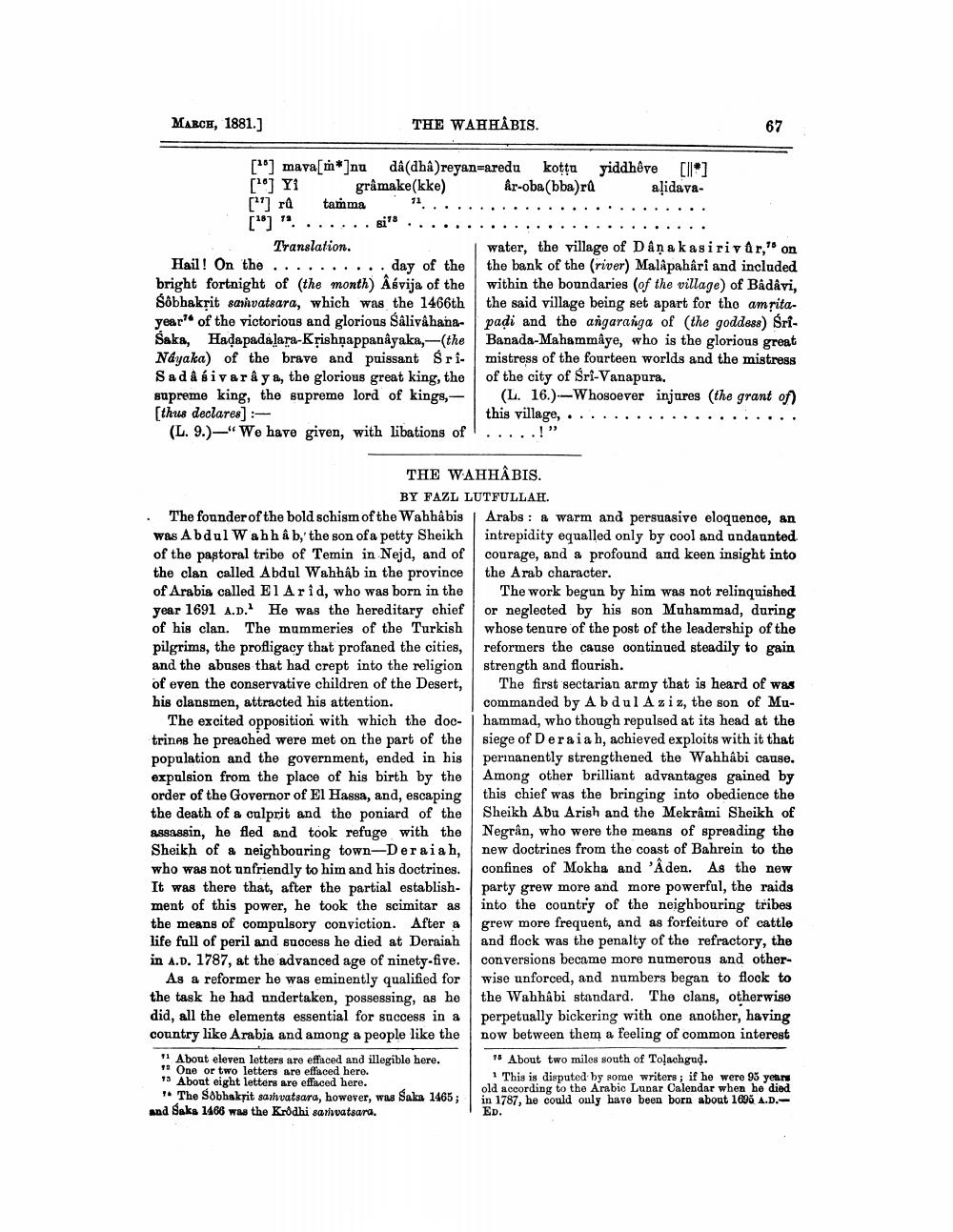________________
MARCH, 1881.]
[] mavathu [2] Yi
["] ra [18]
73
tamma
THE WAHHABIS.
dá(dha)reyan-aredu koṭṭu yiddhêve [*] Ar-oba(bba)ra alidava
grimake(kke)
8i18
71
Translation. Hail! On the .... day of the bright fortnight of (the month) Âśvija of the Śôbhakṛit samvatsara, which was the 1466th year" of the victorious and glorious SâlivâhanaSaka, Hadapadalara-Krishnappankyaka,(the Nayaka) of the brave and puissant ŚrîSadasivaraya, the glorious great king, the supreme king, the supreme lord of kings,[thus declares]:
(L. 9.) "We have given, with libations of
THE WAHHABIS.
BY FAZL LUTFULLAH.
The founder of the bold schism of the Wahhabis was Abdul Wahh â b,' the son of a petty Sheikh of the pastoral tribe of Temin in Nejd, and of the clan called Abdul Wahhab in the province of Arabia called El Arid, who was born in the year 1691 A.D. He was the hereditary chief of his clan. The mummeries of the Turkish pilgrims, the profligacy that profaned the cities, and the abuses that had crept into the religion of even the conservative children of the Desert, his clansmen, attracted his attention.
The excited opposition with which the trines he preached were met on the part of the population and the government, ended in his expulsion from the place of his birth by the order of the Governor of El Hassa, and, escaping the death of a culprit and the poniard of the assassin, he fled and took refuge with the Sheikh of a neighbouring town-Deraiah, who was not unfriendly to him and his doctrines. It was there that, after the partial establishment of this power, he took the scimitar as the means of compulsory conviction. After a life full of peril and success he died at Deraiah in A.D. 1787, at the advanced age of ninety-five.
As a reformer he was eminently qualified for the task he had undertaken, possessing, as he did, all the elements essential for success in a country like Arabia and among a people like the
67
water, the village of Dâna kasirivar," on the bank of the (river) Malâpahârî and included within the boundaries (of the village) of Bâdâvi, the said village being set apart for the amritapadi and the angaranga of (the goddess) ŚrîBanada-Mahammâye, who is the glorious great mistress of the fourteen worlds and the mistress of the city of Sri-Vanapura.
(L. 16.) Whosoever injures (the grant of this village, .!'
About eleven letters are effaced and illegible here. 12 One or two letters are effaced here.
15 About eight letters are effaced here.
The Sobhakrit samvatsara, however, was Saka 1465; and Saka 1466 was the Krodhi samvatsara.
The work begun by him was not relinquished or neglected by his son Muhammad, during whose tenure of the post of the leadership of the reformers the cause continued steadily to gain strength and flourish.
The first sectarian army that is heard of was commanded by Abdul Aziz, the son of Mudoc-hammad, who though repulsed at its head at the siege of Deraiah, achieved exploits with it that permanently strengthened the Wahhâbi cause. Among other brilliant advantages gained by this chief was the bringing into obedience the Sheikh Abu Arish and the Mekrâmi Sheikh of Negrân, who were the means of spreading the new doctrines from the coast of Bahrein to the confines of Mokha and 'Aden. As the new party grew more and more powerful, the raids into the country of the neighbouring tribes grew more frequent, and as forfeiture of cattle and flock was the penalty of the refractory, the conversions became more numerous and otherwise unforced, and numbers began to flock to the Wahhabi standard. The clans, otherwise perpetually bickering with one another, having now between them a feeling of common interest
Arabs a warm and persuasive eloquence, an intrepidity equalled only by cool and undaunted. courage, and a profound and keen insight into the Arab character.
75 About two miles south of Tolachgud.
This is disputed by some writers; if he were 95 years old according to the Arabic Lunar Calendar when he died in 1787, he could only have been born about 1695 A.D.ED.




